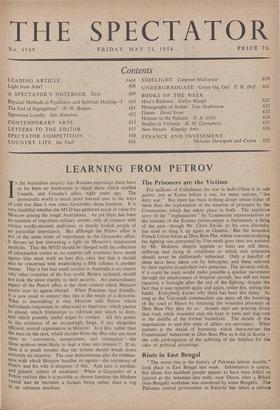LEARNING FROM PETROV
IN the Australian enquiry into Russian espionage there have so far been no disclosures to equal those which startled Canada, and Canada's allies, eight years ago. The democratic world is much more learned now in the ways of cold war than it was when Gouzenko chose freedom. It is very doubtful whether the MVD has gathered much of value for Moscow among the tough Australians. As yet there has been no mention of important military secrets, only of contacts with certain woolly-minded, malicious, or merely foolish people of no particular importance. But although the Petrov affair is not of the same order of importance as the Gouzenko affair, it throws no less interesting a light on Moscow's determined methods. That the MVD should be charged with the collection of information comes as no surprise (all countries have secret agents who must work as best they can), but that it should also be concerned with establishing a fifth column is,another matter. That it has had small success in Australia is no reason why other countries of the free world, Britain included, should not look the more sharply to their security. An extraordinary aspect of the Petrov affair is the close control which Moscow exerts over its agents abroad. When Russians turn friendly, it is now usual to suspect that this is the result of a directive. What is astonishing is that Moscow told Petrov which individuals (important or otherwise) to interview, which parties to attend, which friendships to cultivate and which to drop, and which possibly useful dupes to contact. All this points to the existence of an exceedingly large, if not altogether efficient, central organisation in Moscow. Is it this, rather than the man on the spot, which decides from the files who are most Open to ' conversion, compromise, and corruption '—the three motives most likely to lead a man into treason ? . If so, then it is small wonder that the system should break down seriously on occasion. The case demonstrates also the ruthless- ness with which Moscow handles its agents—the testimony of Petrov and his wife is eloquent of this. And here is another, and greater, source of weakness. When a Gouzenko or a Petrov realises that it is possible to choose freedom the blinkers vanish and he becomes a human being rather than a cog in an inhuman machine.


































 Previous page
Previous page